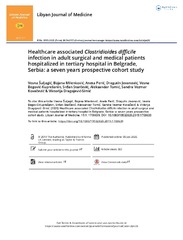Приказ основних података о документу
Healthcare associated Clostridioides difficile infection in adult surgical and medical patients hospitalized in tertiary hospital in Belgrade, Serbia: a seven years prospective cohort study
| dc.creator | Šuljagić, Vesna | |
| dc.creator | Milenković, Bojana | |
| dc.creator | Perić, Aneta | |
| dc.creator | Jovanović, Dragutin | |
| dc.creator | Begović-Kuprešanin, Vesna | |
| dc.creator | Starčević, Srđan | |
| dc.creator | Tomić, Aleksanda | |
| dc.creator | Vezmar-Kovačević, Sandra | |
| dc.creator | Dragojević-Simić, Viktorija | |
| dc.date.accessioned | 2020-03-12T09:26:42Z | |
| dc.date.available | 2020-03-12T09:26:42Z | |
| dc.date.issued | 2020 | |
| dc.identifier.issn | 1993-2820 | |
| dc.identifier.uri | https://farfar.pharmacy.bg.ac.rs/handle/123456789/3549 | |
| dc.description.abstract | Introduction: Clostridioides difficile (C. difficile) infection (CDI) is one of the most common healthcare-associated (HA) infections in contemporary medicine. The risk factors (RFs) for HA CDI in medical and surgical patients are poorly investigated in countries with a limited resource healthcare system. Therefore, the aim of the study was to investigate differences in patients’ characteristics, factors related to healthcare and outcomes associated with HA CDI in surgical and medical patients in tertiary healthcare centre in Serbia. Materials and Methods: A prospective cohort study was conducted including adult patients diagnosed with initial episode of HA CDI, first recurrence of disease, readmission to hospital, while deaths within 30 days of CDI diagnosis and in-hospital mortality were also recorded. Patients hospitalized for any non-surgical illness, who developed initial HA CDI were assigned to medical group, whereas those who developed initial HA CDI after surgical procedures were in surgical group. The data on patients’ characteristics and factors related to healthcare were collected, too. Results: During 7-year period, from 553 patients undergoing in-hospital treatment and diagnosed with CDI, 268 (48.5%) and 285 (51.5%) were surgical and medical patients, respectively. Age ≥ 65 years, use of proton pump inhibitors, chemotherapy and fluoroquinolones were positively associated with being in medical group, whereas admission to intensive care unit and use of second- and third-generation cephalosporins were positively associated with being in surgical group. Conclusions: Based on obtained results, including significant differences in 30-day mortality and in-hospital mortality, it can be concluded that medical patient were more endangered with HA CDI than surgical ones. | en |
| dc.publisher | Taylor & Francis | |
| dc.relation | Ministry of Defence of theRepublic of Serbia [grant number MF VMA 02/17-19]. | |
| dc.rights | openAccess | |
| dc.rights.uri | https://creativecommons.org/licenses/by-nc/4.0/ | |
| dc.source | Libyan Journal of Medicine | |
| dc.subject | cephalosporins | |
| dc.subject | chemotherapy | |
| dc.subject | Clostridioides difficile infection | |
| dc.subject | fluoroquinolones | |
| dc.subject | intensive care unit | |
| dc.subject | medical patients | |
| dc.subject | proton pump inhibitors | |
| dc.subject | surgical patients | |
| dc.title | Healthcare associated Clostridioides difficile infection in adult surgical and medical patients hospitalized in tertiary hospital in Belgrade, Serbia: a seven years prospective cohort study | en |
| dc.type | article | |
| dc.rights.license | BY-NC | |
| dcterms.abstract | Старчевић, Срђан; Томић, Aлександа; Миленковић, Бојана; Беговић-Купрешанин, Весна; Перић, Aнета; Везмар-Ковачевић, Сандра; Драгојевић-Симић, Викторија; Шуљагић, Весна; Јовановић, Драгутин; | |
| dc.citation.volume | 15 | |
| dc.citation.issue | 1 | |
| dc.citation.rank | M22 | |
| dc.identifier.wos | 000505437100001 | |
| dc.identifier.doi | 10.1080/19932820.2019.1708639 | |
| dc.identifier.scopus | 2-s2.0-85077364104 | |
| dc.identifier.fulltext | https://farfar.pharmacy.bg.ac.rs/bitstream/id/7606/bitstream_7606.pdf | |
| dc.type.version | publishedVersion |

